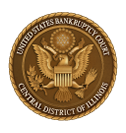You will not receive legal advice if you contact the Clerk's Office or a judge's chambers.
Fairness to all parties requires that the Clerk's Office and judges refrain from providing legal advice. Consequently, you will not receive legal advice if you contact the Clerk's Office or a judge. Note that questions about how to proceed or what to do are considered requests for legal advice.
If you would like to better understand your legal rights, you may wish to speak to an attorney who is familiar with the bankruptcy system. For a general overview of the bankruptcy process, you may wish to consult the US Courts Website.
Judges will not consider ex parte contacts.
Ex parte is a Latin phrase meaning "on one side only; by or for one party." An ex parte communication occurs when a party to a case or a person affiliated with a party to a case communicates with a judge without the knowledge of other parties to the case. For example, a letter addressed to the judge is considered an ex parte communication because no other party has access to it. By contrast, formal court filings are not considered ex parte communications because all parties in the case have access to and the ability to contest them.
To ensure fairness to all parties, Cannon 3 of the Code of Conduct for United States Judges bars judges from considering ex parte communications. Similarly, Federal Rule of Bankruptcy Procedure 9003 prohibits parties to a case and individuals associated with parties to a case from engaging in ex parte communications with judges.
